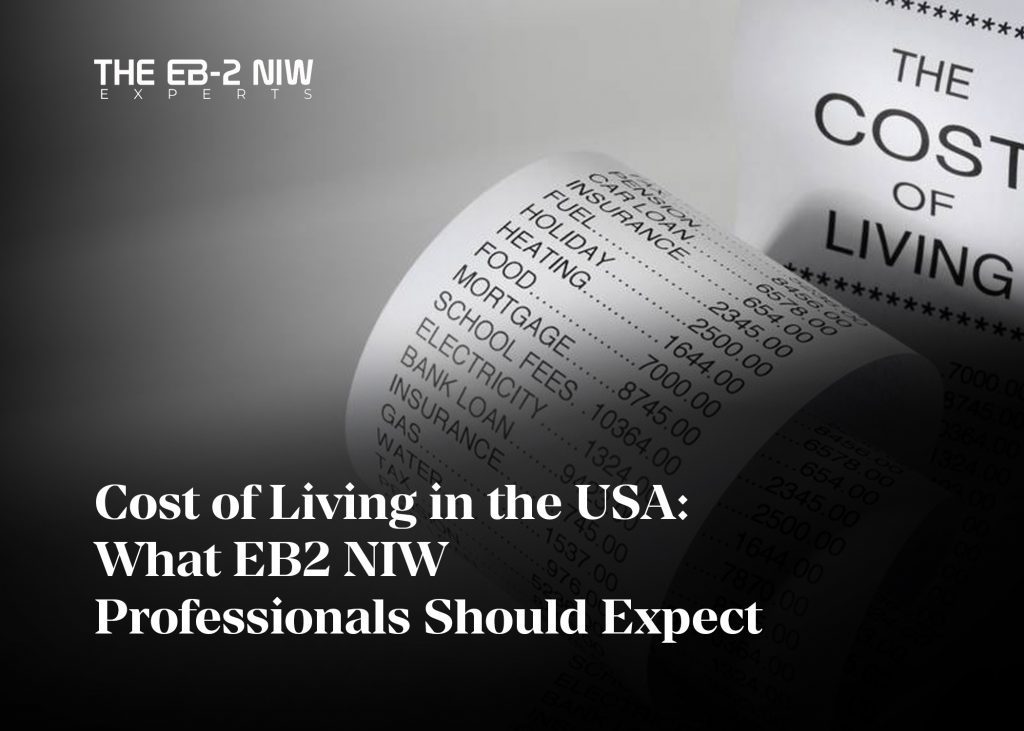Relocating to the United States as an EB2 NIW (Employment-Based Second Preference National Interest Waiver) professional can be a significant career milestone. However, understanding the cost of living in the U.S. is crucial for proper financial planning and a smooth transition. From housing and healthcare to transportation and taxes, this article provides a comprehensive overview of what you should expect.
1. Housing Costs
Housing is often the most significant expense for professionals moving to the U.S. Costs vary widely depending on location. For instance, cities like New York, San Francisco, and Boston have some of the highest rents, with one-bedroom apartments often exceeding $3,000 per month. In contrast, mid-sized cities such as Austin, Texas, or Charlotte, North Carolina, offer more affordable housing options, averaging $1,200 to $1,800 per month.
When selecting a location, proximity to work, access to amenities, and overall quality of life should factor into your decision. Exploring housing options early can help you plan your budget effectively. For more insights on how to optimize your transition to the U.S., visit EB2 NIW Experts.
2. Healthcare Expenses
The U.S. healthcare system is among the most advanced in the world, but it comes at a cost. Unlike many countries with government-subsidized healthcare, the U.S. relies heavily on private insurance. Employer-sponsored health insurance is common, but out-of-pocket costs such as premiums, co-pays, and deductibles can still add up.
On average, individual health insurance premiums are around $500 per month, while family plans can exceed $1,500. It’s crucial to thoroughly review your employer’s health benefits or explore private insurance options to ensure adequate coverage. Learn more about navigating healthcare and other services by exploring the EB2 NIW Experts Services.
3. Transportation Costs
Transportation expenses depend largely on where you live and your commuting habits. In cities with robust public transportation systems like New York, Chicago, or Washington, D.C., many professionals opt to use subways, buses, or trains. Monthly public transit passes range from $50 to $150.
However, in suburban or rural areas, owning a car becomes a necessity. Expect to spend around $3,000 to $5,000 annually on car payments, insurance, fuel, and maintenance. Professionals relocating to areas requiring private vehicles should factor these costs into their budgets.
4. Taxes
Taxes in the U.S. can significantly impact your take-home pay. As an EB2 NIW professional, you’ll be subject to federal income taxes ranging from 10% to 37%, depending on your income bracket. Additionally, many states impose their own income taxes, which can range from 0% (in states like Texas and Florida) to over 13% (in California).
Other taxes, such as property taxes, sales taxes, and Social Security contributions, also add to the overall cost of living. Understanding these obligations early can help you plan your finances effectively. For expert advice on your move, visit EB2 NIW Experts.
5. Education Costs
If you have children or plan to pursue further education, the U.S. education system offers both high-quality public and private options. Public schools are free for residents, though private schools can cost anywhere from $10,000 to $50,000 annually.
For higher education, tuition fees at universities vary greatly. Public institutions charge lower rates for in-state residents, while private colleges can charge upwards of $50,000 annually. Planning ahead for education expenses can ease financial stress.
6. Grocery and Dining Costs
Groceries in the U.S. can cost an individual about $250 to $350 per month, while families may spend $600 to $1,000 monthly. Dining out also varies, with casual meals averaging $10 to $20 per person, and fine dining experiences costing $50 or more per meal.
Adjusting to American food prices may take some time, but shopping smart—such as buying in bulk or taking advantage of promotions—can help keep costs manageable.
7. Utility Bills
Utilities, including electricity, water, heating, and internet, typically cost $150 to $300 per month for an average apartment. These costs fluctuate depending on the size of your home and your location. For instance, colder regions incur higher heating bills, while hotter areas require significant cooling costs during summer.
8. Entertainment and Lifestyle
Balancing work with leisure is essential, and the U.S. offers diverse options. Gym memberships average $30 to $60 monthly, while movie tickets cost about $10 to $15. Costs for concerts, events, or recreational activities vary but provide a wealth of opportunities to explore your new environment.
For updates on adapting to the U.S. lifestyle, visit the EB2 NIW Blog.
9. Financial Tips for EB2 NIW Professionals
To ensure financial stability, follow these tips:
- Create a Budget: Account for fixed expenses like rent and variable costs like dining out.
- Build an Emergency Fund: Having at least three to six months of living expenses saved is critical.
- Utilize Employer Benefits: Take full advantage of relocation assistance, healthcare, and retirement plans.
- Seek Expert Guidance: Professional advice tailored to EB2 NIW holders can streamline your transition. Contact the EB2 NIW Experts Team for personalized support.
Conclusion
The cost of living in the U.S. can be daunting, but with proper planning and guidance, you can adapt and thrive. By understanding key expenses like housing, healthcare, and taxes, EB2 NIW professionals can make informed decisions and build a successful life in their new country.
For expert assistance in navigating your EB2 NIW journey, check out EB2 NIW Experts and learn more about their services tailored to professionals like you. Stay informed by exploring resources from USCIS, and don’t hesitate to reach out for support.


